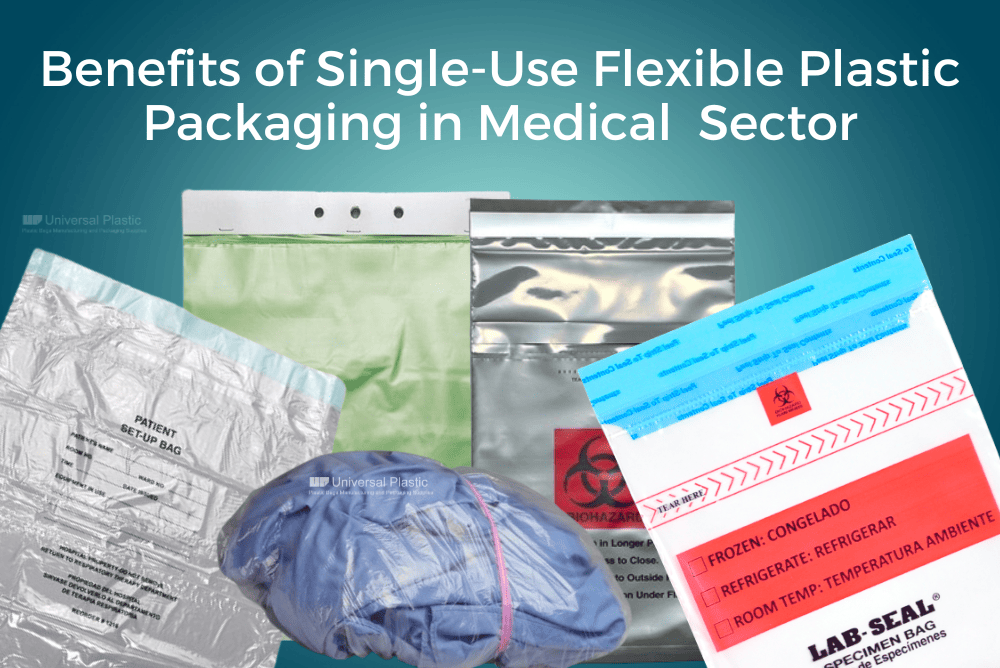
In most spheres of life, single-use plastic is banned or reduced, mainly due to environmental impact. However, medical is one sector, where single-use plastic packaging is used, and this trend is here to stay for safety reasons. The healthcare sector is transitioning even more towards single-use flexible plastic packaging post-COVID-19! A report by Research Nester has projected a steady growth of 5% between 2023 and 2033 and a size of $100 Billion for the single-use flexible plastic packaging market. Single-use packaging is designed for ease of use and considering recyclability and sustainability to reduce carbon footprint. While single-use plastic needs to be discarded upon opening the package, the materials used are eco-friendly.
With an increased focus on hygiene, safety, and convenience, the demand for flexible single-use plastic packaging in healthcare has surged. Even now, in the post-pandemic era, it's crucial to explore the numerous advantages that flexible plastic packaging brings to the forefront of the healthcare industry. This post highlights the benefits of embracing flexible single-use packaging for medical supplies and devices.
What is Single-Use Plastic Packaging?
Single-use packaging encompasses a diverse range of healthcare products designed for one-time use before disposal. Widely embraced in clinical healthcare and home care settings, it includes various polymer forms such as polyethylene, polypropylene, polycarbonate, and polyvinyl chloride, as well as some other materials such as foil, medical-grade paper, and composite materials blending plastic.
Applications of Single-Use Packaging in the Medical Sector
Single-use packaging finds applications across an array of healthcare products, emphasizing sterility and patient safety. Here are some commonly used products that rely on single-use packaging.
- Pre-fillable syringes and needles
- Medical devices spanning Orthopedics, Vascular, Respiratory, Endoscopy, Cardiology, Ophthalmology, and Dental segments
- Surgical instruments
- Wound care supplies
- Catheters
- Diagnostic test strips and home test kits
- Custom procedure trays
- Injectable and vials for medications
- Biologics
- Packaged oral medicines
- Drug delivery systems
Benefits of Single-Use Plastic Healthcare Packaging
Single-use packaging for this sector is strategically designed to maintain product integrity and sterility until the moment of use, ensuring uncompromised safety and efficacy. Several compelling reasons drive the preference for single-use packaging over multi-use alternatives. Here are some pros of single use plastics.
- Enhanced Sterility and Patient Safety: Single-use packaging places paramount importance on patient safety. Each item is individually sealed and sterilized before use, significantly reducing the risk of contamination and microbial exposure. By opting for single-use packaging for pre-fillable syringes, medical devices, and diagnostic kits, healthcare providers create a safe patient environment. The healthcare sector faces various infection risks, many tied to healthcare-associated infections (HAIs). These infections arise from exposure to bacteria, viruses, fungi, and other pathogens during a patient's stay. Single-use packaging effectively mitigates these risks, addressing potential complications before they materialize.
- Ease of Use and Efficiency: Time is crucial in healthcare settings, especially during emergencies where a few seconds can impact a patient's life outcome. Single-use packaging consistently proves its worth in terms of convenience and accessibility. It is designed for swift and hassle-free access and enables healthcare professionals to prioritize patient treatment over product preparation and unpacking. Moreover, the simplicity of single-use packaging minimizes handling, reducing the likelihood of procedural errors and contamination.
- Time and Labor Savings: Multi-use healthcare packaging demands significant resources for maintenance and upkeep. Beyond the initial purchase cost, ongoing expenses encompass cleaning, maintenance, and sterilizing packaging materials. Single-use packaging eliminates the need for ongoing maintenance, streamlining packaging costs into a one-time expenditure. It also reduces the reliance on autoclave and sterilization equipment within healthcare facilities and hospitals.
Conclusion
In conclusion, Universal Plastic recognizes the pivotal role of ecofriendly single-use healthcare packaging in ensuring patient safety and minimizing contamination risks. By choosing single-use packaging, healthcare providers prioritize the well-being of their patients and streamline operational efficiency. With a comprehensive range of wholesale medical bags, including Adhesive Closure Bags, Security Bags, Specimen Bags, and more, Universal Plastic supports the healthcare sector's mission to deliver top-notch care while prioritizing safety and sustainability. Embracing flexible plastic packaging is essential to meet the evolving demands of patient care and operational efficiency in the healthcare industry. Contact Universal Plastic today to explore the advantages of flexible single-use packaging for your healthcare needs.
